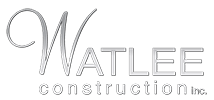Building a luxury home represents one of life’s most significant investments and personal achievements. In 2025, the luxury home market continues to evolve with increased demand for sustainable materials, smart home integration, and personalized living experiences that reflect individual lifestyle preferences. Unlike standard construction projects, a luxury home build requires meticulous planning, premium materials, and expert craftsmanship to transform your unique vision into reality.
This comprehensive guide will walk you through every aspect of luxury home construction, from understanding what defines luxury building to navigating costs, timelines, and the selection of world class amenities that create your dream home. Whether you’re planning your first custom luxury home or looking to understand the complexities of high-end construction, this guide provides the expertise you need to make informed decisions throughout your building journey.
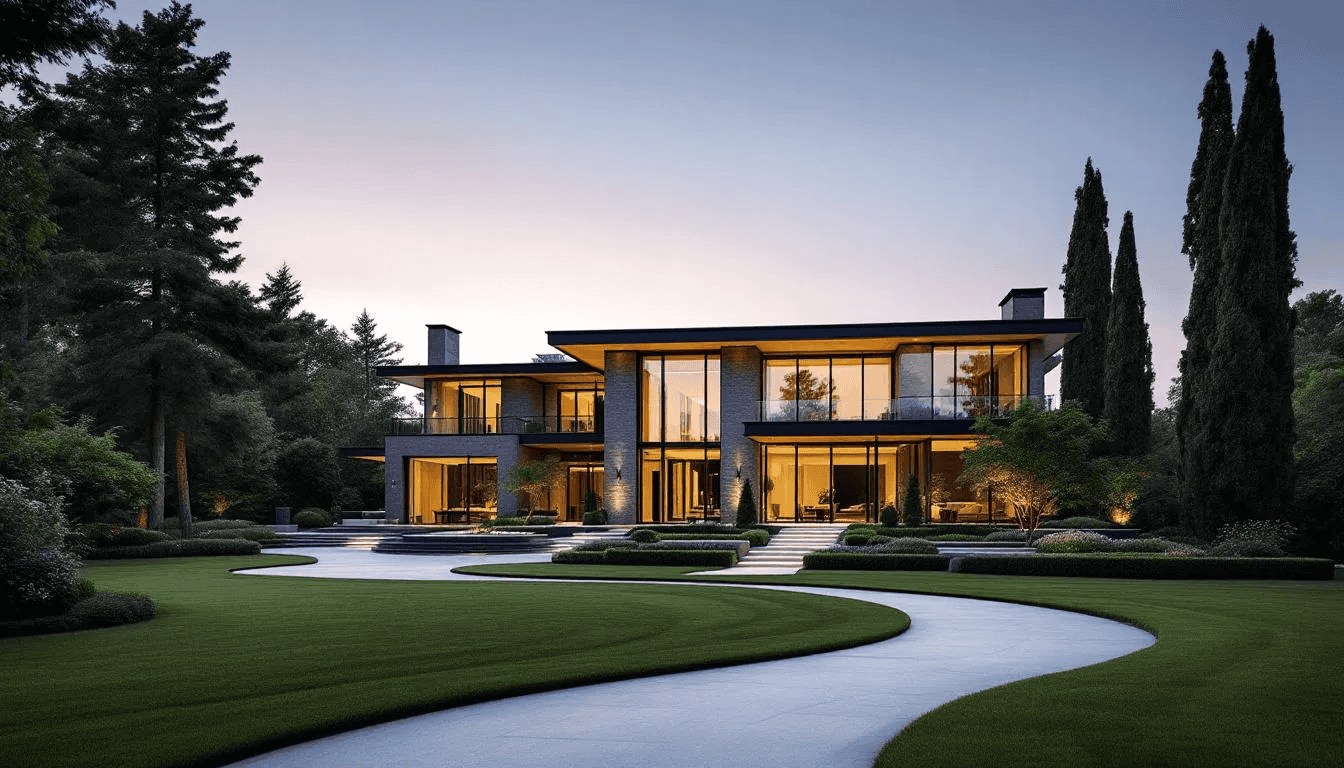
What is Luxury Home Building?
Luxury home building goes far beyond simply constructing a large house with an expensive price tag. At its core, luxury construction focuses on creating one-of-a-kind residences distinguished by premium materials, custom architecture, state-of-the-art technology, and meticulous attention to detail that reflects the homeowner’s unique lifestyle and preferences.
The defining characteristics of luxury home construction include the use of high quality materials such as imported marble, rare hardwoods, and custom millwork. These projects typically involve collaboration with leading architects, designers, and skilled artisans who execute intricate stonework, bespoke installations, and personalized features that cannot be found in standard custom homes.
Key Differences Between Luxury Builds and Standard Custom Homes
Understanding what sets luxury construction apart helps clarify the investment and expectations involved in your project:
Material Quality and Sourcing: Luxury homes employ top-tier, often imported materials with emphasis on both durability and aesthetics. While standard custom homes may use mid-range options, luxury builds feature the finest materials available, from hand-selected stone to premium hardwood flooring.
Design Complexity and Craftsmanship: Architectural design for luxury homes involves more intricate and individualized planning, often featuring multiple wings, cutting-edge structural elements, and unique architectural attributes. The level of craftsmanship extends to every detail, from custom cabinetry to artisanal metalwork.
Attention to Detail: Every element receives elevated consideration, with finishing details that include artisanal elements, designer lighting, and high-end fixtures throughout the residence. Quality control involves more frequent inspections and tighter tolerances than standard construction.
Amenities and Specialized Spaces: Luxury homes typically include specialty spaces such as home theaters, wine cellars, spa suites, professional-grade kitchens, indoor gyms, and resort-style outdoor living areas that define luxurious living.
Current Market Trends in 2025
The luxury home market continues to be shaped by evolving lifestyle preferences and technological advancement:
Sustainability and Eco-Consciousness: Modern luxury buyers demand green building practices, including reclaimed wood, low-VOC materials, and locally sourced stone. High-performance insulation, energy recovery systems, and sustainable construction methods are now baseline expectations.
Smart Home Integration: Comprehensive automation controlling lighting, climate, security, and entertainment through centralized systems represents the modern standard. Biometric access, intelligent surveillance, and connected appliances create seamless living experiences.
Wellness-Driven Design: Luxury homes increasingly incorporate biophilic design elements, air and water purification systems, and dedicated wellness spaces that promote health and well-being.
Benefits of Choosing Luxury Home Construction
Investing in luxury construction provides several long-term advantages:
- Enhanced Property Value: Luxury homes appreciate faster due to superior materials, prime locations, and timeless design elements
- Personalized Living Experience: Every space reflects your specific tastes, lifestyle, and evolving needs
- Cutting-Edge Technology: Early adoption of innovations provides enhanced convenience, security, and energy efficiency
- Exclusivity and Pride: Your residence stands out for its architectural uniqueness and exceptional quality
Luxury Home Building Costs and Pricing
Understanding the financial investment required for luxury home construction helps establish realistic expectations and proper budget planning. Luxury home builds typically represent a significant premium over standard construction, reflecting the superior materials, craftsmanship, and customization involved in creating these exceptional residences.
Average Cost Range and Market Comparisons
Luxury homes in the United States typically cost between $300 and $800 per square foot, compared to $150 to $250 for standard custom homes. This substantial difference reflects the premium materials, specialized labor, and extensive customization that defines luxury construction.
Overall project budgets for luxury homes usually start around $1.5 million and can exceed $10 million, particularly in prime metropolitan areas or for homes featuring extensive grounds, complex architecture, or ultra-premium amenities. The final cost depends heavily on location, size, architectural complexity, and the level of luxury features included.
Typical Cost Breakdown
Understanding how luxury home budgets are allocated helps in planning and decision-making:
| Cost Category | Percentage of Total Budget |
|---|---|
| Land Acquisition | ~30% |
| Core Construction Costs | ~50% |
| Finishes and Luxury Amenities | ~20% |
These percentages can vary significantly based on location and project scope, with high-end finishes and specialty features potentially driving costs even higher in ultra-luxury builds.
Regional Pricing Variations
Location significantly impacts luxury home building costs across different markets:
California (Los Angeles, San Francisco Bay Area): $500-$1,000+ per square foot, with entry-level luxury homes starting at $3 million. Prime locations and strict building regulations contribute to premium pricing.
Florida (Miami Metropolitan Area): $400-$800 per square foot, where waterfront access and hurricane-resistant engineering requirements can substantially increase costs.
Texas (Austin, Dallas): $300-$600 per square foot, offering more affordable land but with prices rising sharply in premier neighborhoods and communities.
North Carolina (Charlotte/Raleigh): $250-$500 per square foot, benefiting from lower labor and land costs, though luxury lakefront or mountain properties command significant premiums.
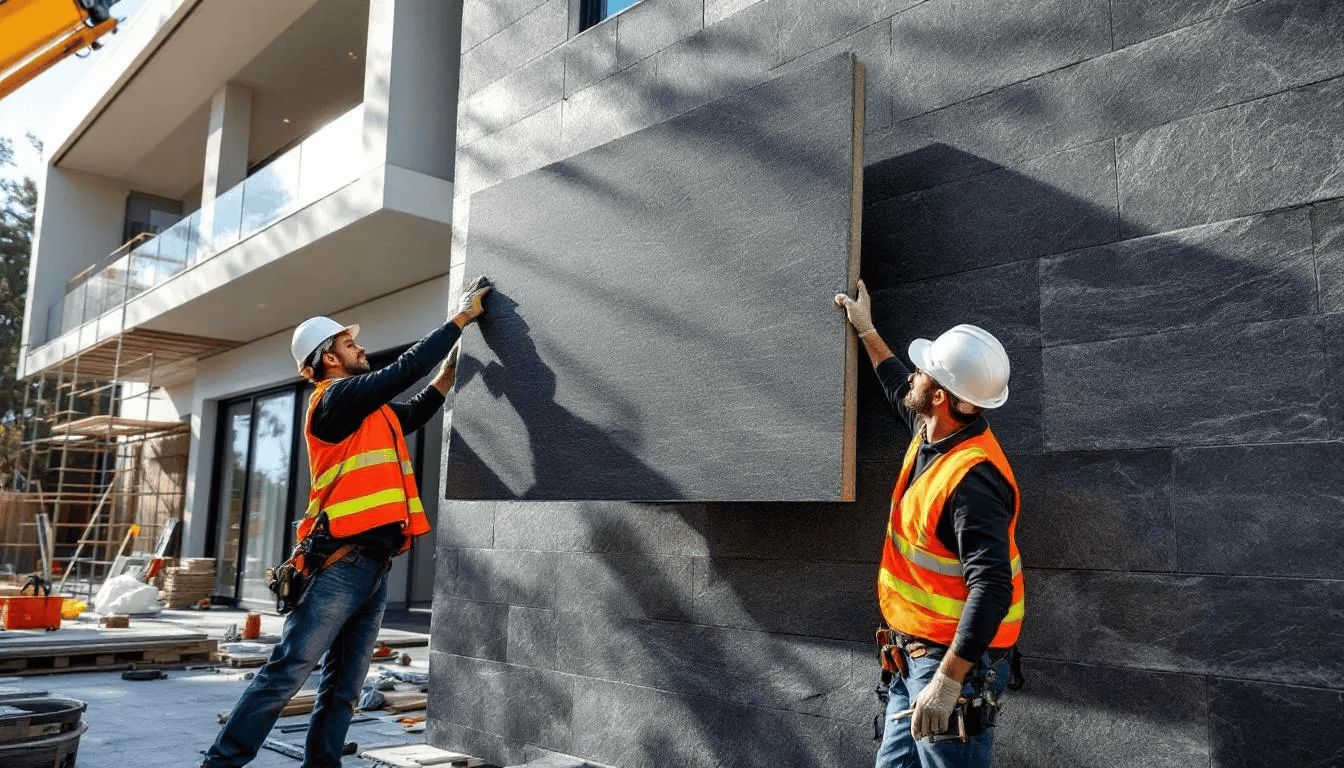
Factors Affecting Luxury Home Building Costs
Several key factors significantly influence the final cost of your luxury home build, and understanding these elements helps in making informed decisions throughout the planning and construction process.
Location and Land Acquisition
Land costs vary dramatically based on location and desirability, ranging from $200,000 in rural or exurban areas to well over $2 million for highly sought-after urban or coastal lots. The scarcity of buildable parcels in established luxury communities often drives premium pricing, while factors such as views, privacy, and proximity to amenities further influence land values.
Home Size and Architectural Complexity
Custom layouts, multi-level structures, and innovative architectural geometries require specialized engineering and skilled labor, expanding both construction time and budget. Complex roof lines, extensive use of glass, and unique structural elements demand premium materials and craftsmanship that significantly impact costs.
Premium Materials Selection
Luxury homes eschew standard building materials in favor of imported stone, custom millwork, specialty glass, and designer fixtures. Examples include hand-selected marble from Italian quarries, reclaimed hardwood flooring, custom cabinetry, and artisanal metalwork that can dramatically increase material costs.
Luxury Amenities and Features
High-end amenities represent substantial investments within luxury home budgets:
- Custom swimming pools and water features: $100,000-$250,000+
- Home theaters with acoustic design: $100,000-$300,000+
- Wine cellars with climate control: $50,000-$150,000+
- Smart home automation systems: $25,000-$100,000+
- Professional-grade outdoor kitchens: $75,000-$200,000+
Soft Costs and Professional Services
Permit fees, architectural design, interior design, and professional project management typically add 15-25% to the base construction cost. These other associated fees include engineering consultations, specialty permits, and extended design development that ensure your project meets luxury standards.
Site-Specific Challenges
Unforeseen site conditions, significant excavation requirements, or extended permitting processes in luxury communities can dramatically increase costs. Geotechnical challenges, environmental considerations, and community design review processes may extend timelines and budgets beyond initial projections.
The Luxury Home Building Process
Successfully navigating the luxury home building process requires understanding the distinct phases, timelines, and quality standards that differentiate high-end construction from standard building projects. This comprehensive process typically spans 12 to 24 months from initial planning to move-in, depending on project complexity, site conditions, and the scope of customization involved.
Timeline Overview and Key Milestones
The luxury home building process involves several distinct phases, each requiring careful attention to detail and quality control measures:
Pre-Construction Planning (3-6 months): This critical phase involves assembling your project team, finalizing budgets, securing permits, and completing all preparatory work before construction begins.
Design Development (2-6 months): Architectural planning, interior design, and system integration planning occur simultaneously to ensure seamless coordination throughout construction.
Construction Phase (12-18+ months): The actual building process, from foundation to final finishes, requires close supervision and quality control to maintain luxury standards.
Final Inspections and Handover (1-2 months): Comprehensive quality reviews, punch list completion, and owner orientation ensure the finished home meets all specifications.

Pre-Construction Planning Phase
Successful luxury home building begins with thorough planning that establishes realistic expectations and clear project parameters. This phase involves several critical activities that set the foundation for your entire project.
Budget Establishment: Setting realistic budgets with 10-15% contingency funds helps accommodate the unexpected costs that commonly arise in luxury construction. This contingency proves essential for managing design changes, site challenges, or material upgrades that enhance the final result.
Team Assembly: Creating your dream team of experienced luxury professionals represents one of the most important decisions in your project. This typically includes:
- A luxury-specialist architect with experience in your preferred style
- A custom builder with demonstrated expertise in high-end construction
- Interior designers specializing in luxury finishes and furnishings
- Landscape architects and technology integration specialists
Site Selection and Preparation: Evaluating potential building sites involves considering topography, views, solar orientation, privacy, and compliance with community covenants or architectural restrictions. Many luxury communities maintain strict design standards that influence architectural planning and material selection.
Permit Acquisition: Obtaining necessary permits can take 3-6 months, particularly when design review boards are involved or environmental assessments are required. Luxury communities often have extensive approval processes that require additional time and documentation.
Design and Architectural Planning
The design phase transforms your vision into detailed plans that guide construction while maximizing your site’s potential and incorporating the latest in luxury living standards.
Architectural Development: Creating custom architectural plans begins with understanding your lifestyle needs, aesthetic preferences, and functional requirements. Modern luxury design maximizes natural light, optimizes views, and creates seamless indoor-outdoor living experiences while incorporating sustainable building practices.
Interior Design Integration: Interior planning occurs simultaneously with architectural development to ensure proper space allocation, lighting design, and infrastructure for luxury features. This coordination prevents costly changes during construction and ensures optimal functionality and aesthetics.
Technology Planning: Smart home systems require extensive planning during the design phase to ensure proper infrastructure for automation, security, entertainment, and energy management systems. This includes planning for concealed wiring, control panels, and future technology upgrades.
Sustainability Integration: Modern luxury homes incorporate sustainable design features as standard practice, including high-performance insulation, energy-efficient systems, and environmentally responsible materials that reduce long-term operating costs while maintaining luxury standards.
Construction and Building Phase
The construction phase transforms architectural plans into your finished luxury home through careful execution and quality control measures that ensure every detail meets the highest standards.
Foundation and Structural Work: Luxury construction typically employs commercial-grade materials and techniques, including deep foundations, specialized waterproofing, and engineered structural systems designed for durability and performance. Site conditions may require additional engineering for challenging terrain or environmental factors.
Systems Installation: Complex mechanical, electrical, and plumbing systems require specialized installation to accommodate luxury features and smart home technology. This includes redundant systems, high-capacity electrical service, and sophisticated HVAC systems that provide optimal comfort and efficiency.
Finish Installation: The installation of luxury finishes requires skilled craftspeople experienced in working with premium materials. Custom millwork, imported stone, hardwood flooring, and specialty fixtures demand precise installation techniques and careful quality control throughout the process.
Quality Control Measures: Luxury construction involves rigorous inspection protocols at every stage, with documented photography and detailed punch lists ensuring all work meets contract specifications. Regular quality walks with the homeowner help identify and address any concerns before project completion.
Choosing the Right Luxury Home Builder
Selecting the appropriate custom builder represents one of the most critical decisions in your luxury home building journey. The right builder combines technical expertise, project management skills, and a proven track record of delivering exceptional results that meet the exacting standards of luxury construction.
Essential Qualifications and Experience
When evaluating potential luxury home builders, several key qualifications separate exceptional contractors from standard custom home builders:
Licensing and Insurance: Verify that any prospective builder maintains proper licensing for multi-million-dollar residential projects and carries comprehensive insurance coverage appropriate for luxury construction values. This protection proves essential for projects of this scale and complexity.
Portfolio and Experience: Review the builder’s portfolio of completed luxury homes, focusing on projects similar in size, architectural style, and price range to your planned home. Experienced luxury builders demonstrate consistent quality across multiple high-end projects and can provide references from satisfied clients.
Communication and Project Management: Luxury construction requires exceptional communication skills and sophisticated project management systems. The best builders provide regular progress reports, maintain detailed documentation, and offer direct access to project managers throughout the construction process.
Warranty and Support: Comprehensive warranty programs and ongoing post-construction support distinguish quality luxury builders. Look for builders offering extended warranties and annual maintenance programs that protect your investment long after construction completion.
Due Diligence and Builder Selection
Thorough evaluation of potential builders helps ensure you select a partner capable of executing your vision while maintaining the highest quality standards throughout your project.
Reference Verification: Request detailed references from recent luxury clients and, when possible, arrange tours of completed homes. Speaking directly with past clients provides insights into the builder’s communication style, problem-solving abilities, and overall satisfaction with the finished product.
Subcontractor Relationships: Luxury construction requires specialized trades and artisans experienced in high-end materials and techniques. Evaluate the builder’s relationships with subcontractors and their process for selecting and supervising specialty trades throughout your project.
Quality Control Protocols: Understanding the builder’s quality control measures helps ensure consistent results throughout construction. The best luxury builders employ multiple inspection checkpoints, detailed documentation, and proactive problem resolution to maintain standards.
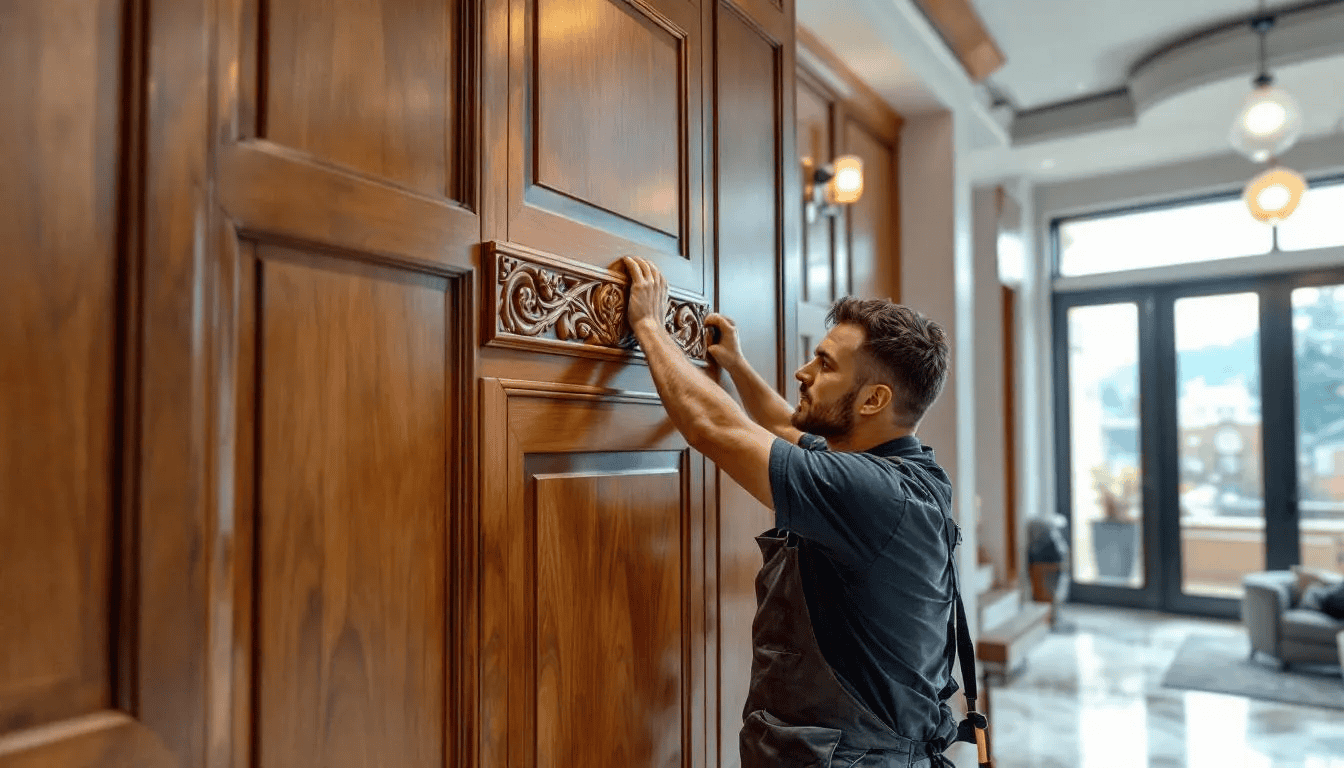
Key Questions for Potential Builders
Asking the right questions during builder interviews helps identify the most qualified candidates for your luxury home project:
Experience and Expertise: “What is your experience with projects similar in size, architectural complexity, and budget to mine?” This question helps determine whether the builder has relevant experience with your specific requirements and challenges.
Communication and Project Management: “What is your process for communication and managing design changes throughout construction?” Understanding their communication style and change management procedures helps prevent misunderstandings and cost overruns.
Timeline and Scheduling: “What are your typical timeline expectations, and how do you manage potential delays?” Realistic scheduling and proactive delay management demonstrate professional project management capabilities.
Quality Assurance: “Can you describe your quality control measures and provide examples of how you’ve handled quality issues in past projects?” This reveals their commitment to maintaining luxury standards and their problem-solving approach.
References and Portfolio: “May I contact recent clients and visit completed luxury homes you’ve built?” Direct client contact and home visits provide the most reliable assessment of builder quality and client satisfaction.
Luxury Home Features and Amenities
Modern luxury homes distinguish themselves through carefully curated features and world class amenities that enhance daily living while reflecting personal style and preferences. These elements transform houses into personalized retreats that accommodate both intimate family life and elegant entertaining.
High-End Kitchen Design
The kitchen often serves as the heart of luxury home design, featuring professional-grade appliances, custom cabinetry, and premium materials that create both functional workspace and stunning visual centerpiece.
Professional Appliances: Luxury kitchens typically feature top-tier brands such as Sub-Zero refrigeration, Wolf cooking equipment, and specialized appliances like wine refrigerators, warming drawers, and built-in coffee systems. These commercial-quality appliances provide exceptional performance and durability.
Custom Cabinetry and Storage: Bespoke cabinetry maximizes storage while providing architectural interest through custom millwork, specialty finishes, and innovative storage solutions. Walk-in pantries with custom organization systems and oversized islands with integrated seating create functional luxury.
Premium Surfaces: Imported natural stone, engineered quartz, and custom materials create stunning countertops and backsplashes. These surfaces combine beauty with functionality, providing durable work surfaces that enhance the kitchen’s aesthetic appeal.
Master Suite Luxury
Luxury master suites create private retreats within the home, featuring spa-inspired bathrooms, spacious dressing areas, and architectural elements that promote relaxation and comfort.
Spa-Inspired Bathrooms: Master bathrooms in luxury homes feature oversized soaking tubs, multi-head shower systems, heated floors, and premium fixtures that create resort-like experiences. Natural stone, custom tile work, and sophisticated lighting design enhance the luxurious atmosphere.
Dressing Room Design: Walk-in closets in luxury homes function as custom dressing rooms with built-in storage systems, seating areas, and specialized lighting. These spaces accommodate extensive wardrobes while providing convenient organization and display.
Private Outdoor Access: Many luxury master suites include private balconies, terraces, or garden access that extends the living space outdoors while maintaining privacy and tranquility.
Entertainment and Recreation Spaces
Luxury homes accommodate diverse entertainment needs through dedicated spaces designed for specific activities and enjoyment.
Home Theater Design: Custom home theaters feature acoustic engineering, professional projection systems, and luxurious seating arrangements that rival commercial venues. Specialized lighting, sound dampening, and climate control create optimal viewing environments.
Wine Storage and Tasting: Climate-controlled wine rooms with custom racking, tasting areas, and display lighting protect valuable collections while providing elegant spaces for appreciation and entertaining.
Recreation and Fitness: Dedicated fitness centers, indoor sports courts, and game rooms provide year-round recreation opportunities tailored to family interests and lifestyle preferences.
Outdoor Living Excellence
Luxury outdoor spaces extend the home’s living areas into beautifully landscaped environments that accommodate relaxation, recreation, and entertaining throughout the seasons.
Resort-Style Pool Areas: Custom swimming pools with infinity edges, integrated spas, and sophisticated water features create backyard resorts. Automated systems, premium materials, and architectural lighting enhance both beauty and functionality.
Outdoor Kitchen and Dining: Professional-grade outdoor kitchens with premium appliances, custom cabinetry, and weather-resistant materials enable sophisticated outdoor entertaining. These spaces often include dining areas, fire features, and integrated audio systems.
Landscape Integration: Professionally designed landscapes incorporating native plants, water features, and architectural elements create natural beauty that complements the home’s architecture while providing privacy and seasonal interest.
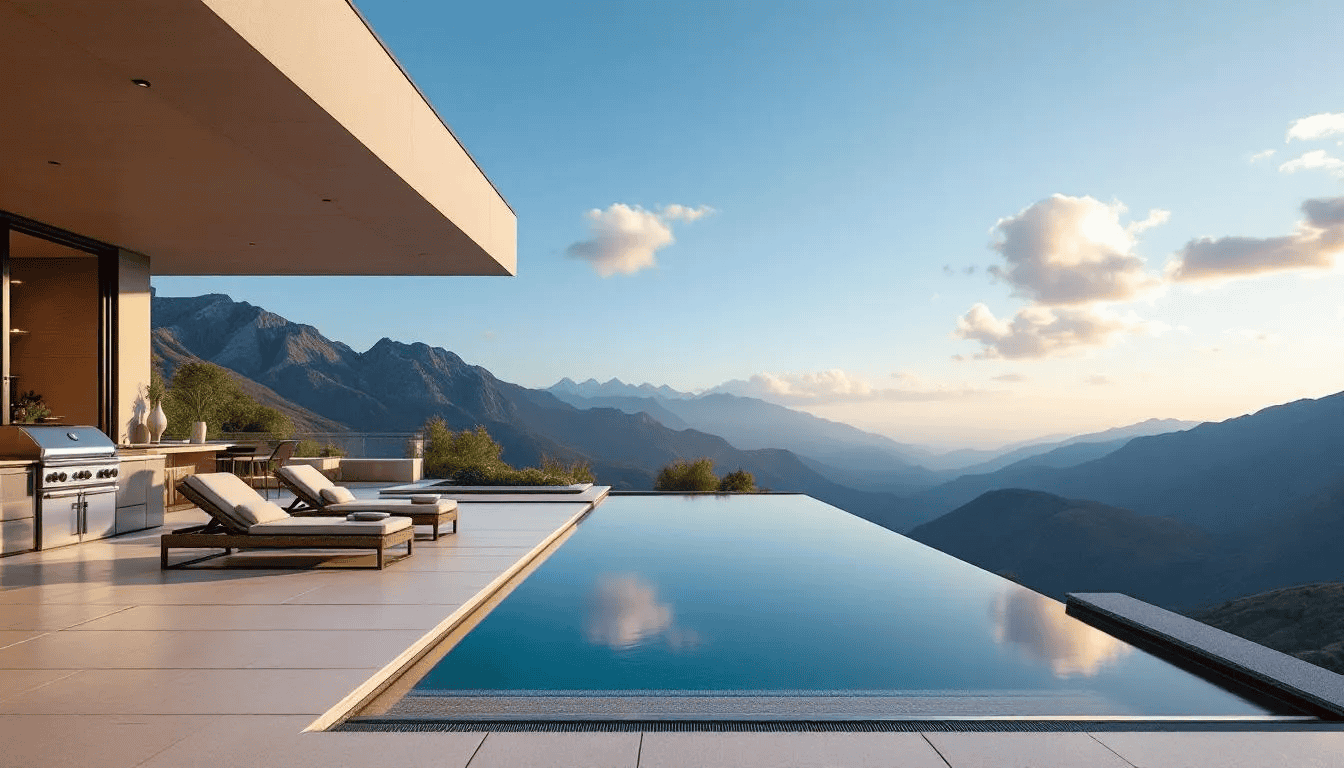
Smart Home Technology Integration
Modern luxury homes seamlessly integrate advanced technology systems that enhance security, convenience, and energy efficiency while maintaining the aesthetic elegance that defines luxury living. These systems represent essential infrastructure in contemporary high-end construction.
Whole-Home Automation Systems
Comprehensive automation systems provide centralized control of lighting, climate, security, and entertainment through intuitive interfaces that simplify daily life while optimizing home performance.
Lighting Control: Automated lighting systems create customized scenes for different activities and times of day while optimizing energy efficiency. Smart controls adjust interior and exterior lighting based on occupancy, natural light levels, and personal preferences.
Climate Management: Sophisticated HVAC controls maintain optimal comfort throughout the home while minimizing energy consumption. Zoned systems provide individual room control, while smart thermostats learn preferences and adjust automatically for maximum efficiency.
Integration and Control: Unified control systems accessible through tablets, smartphones, or dedicated control panels provide seamless operation of all home systems. These interfaces offer intuitive control while maintaining the sophisticated aesthetic appropriate for luxury interiors.
Advanced Security Features
Luxury home security systems provide comprehensive protection through multiple layers of technology that ensure safety while maintaining privacy and convenience.
Access Control: Biometric entry systems, smart locks, and automated gate controls provide secure access while eliminating the need for traditional keys. These systems maintain detailed access logs while accommodating family members, staff, and guests.
Surveillance and Monitoring: Professional-grade camera systems with AI analytics provide comprehensive property monitoring while respecting privacy boundaries. These systems integrate with smart phones and professional monitoring services for complete peace of mind.
Perimeter Protection: Sophisticated perimeter monitoring systems detect intrusion attempts while minimizing false alarms through advanced sensors and intelligent analysis.
Energy Management and Sustainability
Smart energy systems optimize efficiency while reducing environmental impact through intelligent monitoring and control of all home systems.
Solar Integration: Grid-tied solar systems with battery backup provide renewable energy while maintaining connection to utility power. Smart inverters and monitoring systems optimize performance while providing detailed energy production data.
Efficient Systems: High-efficiency HVAC equipment, LED lighting, and smart appliances reduce energy consumption while maintaining luxury comfort standards. These systems often include heat recovery ventilation and other advanced efficiency measures.
Monitoring and Optimization: Real-time energy monitoring systems provide detailed consumption data that enables optimization of efficiency while maintaining comfort and convenience.
Common Luxury Home Building Challenges and Solutions
Even the most carefully planned luxury home projects encounter challenges that require proactive management and experienced solutions. Understanding common issues and their prevention helps ensure successful project completion while maintaining quality standards and budget control.
Budget Management and Cost Control
Luxury home projects face unique budget challenges due to their complexity, customization requirements, and high-end material specifications that can impact final costs.
Change Order Management: Design modifications during construction represent one of the most significant budget risks in luxury building. Successful projects establish clear change order procedures that document all modifications with detailed cost and timeline impacts before approval.
Material Cost Fluctuations: Premium materials often have longer lead times and greater price volatility than standard construction materials. Experienced builders order materials early and maintain relationships with suppliers to minimize cost surprises and delivery delays.
Scope Creep Prevention: Luxury projects often generate additional ideas and upgrades during construction. Clear initial specifications and regular budget reviews help maintain scope control while accommodating reasonable improvements that enhance the final result.
Timeline Management and Scheduling
Complex luxury projects require sophisticated scheduling coordination among multiple specialty trades and custom material deliveries that can impact project timelines.
Weather Impact Mitigation: Extended construction timelines increase weather exposure risks. Quality builders plan for seasonal weather patterns and maintain flexibility in scheduling to accommodate delays beyond anyone’s control.
Permit and Approval Delays: Luxury communities often have extensive review processes that can delay construction starts. Experienced builders begin permit applications early and maintain relationships with local authorities to expedite approvals when possible.
Specialty Trade Coordination: High-end finishes require skilled craftspeople whose availability may be limited. The best builders maintain relationships with proven specialty contractors and plan their schedules well in advance.
Quality Control and Standards Maintenance
Maintaining luxury quality standards throughout construction requires vigilant oversight and proactive problem resolution at every project phase.
Inspection Protocols: Regular third-party inspections supplement builder quality control measures to ensure all work meets luxury standards. Documented inspections provide accountability and early identification of potential issues.
Material Quality Assurance: Premium materials require careful handling and installation to maintain their quality and appearance. Experienced trades familiar with luxury materials prevent damage and ensure proper installation techniques.
Communication and Documentation: Clear communication channels between all project participants prevent misunderstandings that can impact quality. Regular progress meetings and detailed documentation maintain project coordination and quality accountability.
Financing Your Luxury Home Build
Securing appropriate financing for luxury home construction requires understanding specialized loan products and working with lenders experienced in high-end construction projects. These complex transactions involve unique considerations beyond standard mortgage financing.
Construction-to-Permanent Loans
Most luxury builds utilize construction-to-permanent loan structures that fund construction in stages and convert to traditional mortgages upon completion. These loans require detailed planning and documentation throughout the construction process.
Draw Schedule Management: Construction loans fund projects through scheduled draws that correspond to construction milestones. Lenders inspect completed work before releasing funds, requiring coordination between builders, borrowers, and financial institutions.
Interest-Only Payments: During construction, borrowers typically pay interest only on drawn funds, with principal payments beginning after conversion to permanent financing. This structure minimizes carrying costs during the construction period.
Conversion Requirements: Successful conversion to permanent financing requires final inspections, certificate of occupancy, and property appraisal that confirms the home’s completed value meets loan requirements.
Documentation and Qualification Requirements
Luxury construction loans require extensive documentation that demonstrates both the borrower’s financial capacity and the project’s viability.
Financial Documentation: Lenders require comprehensive financial statements, verified income documentation, and asset verification that demonstrates ability to complete the project and service the permanent debt.
Project Documentation: Detailed architectural plans, engineering specifications, and contractor agreements provide lenders with confidence in project feasibility and final value.
Down Payment Requirements: Construction loans typically require 20-30% down payments, with some luxury projects requiring higher equity contributions based on loan size and borrower qualifications.
Lender Selection and Relationship Management
Choosing lenders experienced in luxury construction financing ensures smooth processing and appropriate loan terms for high-end projects.
Specialized Lenders: Banks and credit unions with dedicated luxury lending programs understand the unique aspects of high-end construction and can provide appropriate loan structures and terms.
Relationship Benefits: Established relationships with experienced lenders can expedite approval processes and provide flexibility when project modifications or timeline adjustments become necessary.
Professional Guidance: Working with mortgage professionals experienced in construction lending helps navigate complex documentation requirements and ensures proper coordination throughout the construction process.
About Watlee Construction, Inc.
Watlee Construction, Inc. stands as a premier luxury home builder specializing in custom construction that transforms architectural visions into exceptional living experiences. With extensive experience in high-end residential construction, Watlee Construction brings together skilled craftsmanship, innovative design solutions, and meticulous project management to create homes that exceed client expectations while maintaining the highest quality standards.
The company’s approach to luxury home building emphasizes collaborative design processes that ensure each residence reflects the unique lifestyle and preferences of its owners. Through partnerships with leading architects, interior designers, and specialty craftspeople, Watlee Construction delivers completely customized homes that incorporate the latest in sustainable building practices, smart home technology, and world class amenities.
Watlee Construction’s comprehensive services encompass every aspect of luxury home development, from initial site evaluation and design consultation through final inspection and ongoing maintenance support. Their experienced team understands the complexities of high-end construction and maintains the communication standards and quality control measures essential for successful luxury projects.
The company’s commitment to excellence extends beyond construction completion through comprehensive warranty programs and ongoing maintenance services that protect homeowner investments while ensuring continued satisfaction with their luxury living experience. This dedication to long-term client relationships has established Watlee Construction as a trusted partner for discerning homeowners seeking exceptional custom luxury homes.
With deep regional knowledge of permitting processes, building codes, and local supplier networks, Watlee Construction efficiently navigates the complexities of luxury construction while maintaining transparent communication throughout every project phase. Their proven track record of delivering projects on schedule and within budget demonstrates the professional project management and quality craftsmanship that defines their approach to luxury home building.
Frequently Asked Questions (FAQ)
What is considered a luxury home? A luxury home is defined by bespoke architecture, high quality materials, premium amenities, and a personalized design and construction process that generally exceeds local market standards in value, finishes, and features. These homes typically feature custom millwork, imported materials, advanced technology systems, and world class amenities that create unique living experiences.
How long does it take to build a luxury home? The timeline for luxury home construction typically ranges from 12 to 24 months, depending on the size, architectural complexity, site conditions, and permit approval processes. More complex projects with extensive custom features may require additional time to ensure proper execution of all luxury elements and quality standards.
What is the average cost per square foot for luxury home construction? Luxury homes typically cost between $300 and $800 per square foot, though costs can exceed $1,000 per square foot in premium markets or for highly complex architectural designs. This compares to $150-$250 per square foot for standard custom homes, reflecting the premium materials, specialized labor, and extensive customization involved.
What features are most requested in luxury homes? The most sought-after features in modern luxury homes include comprehensive smart home technology integration, sustainable and energy-efficient systems, spa-inspired master suites, professional-grade kitchens, advanced security systems, and expansive outdoor living areas with resort-style amenities.
What are the most significant challenges in luxury home building? Common challenges include budget management due to premium materials and custom features, timeline coordination among specialty trades, maintaining quality control standards throughout construction, and managing design changes that can impact both cost and schedule.
How do I select the right luxury home builder? Look for builders with proper licensing and insurance for high-value projects, documented experience with similar luxury homes, strong portfolios with verifiable client references, transparent communication processes, and comprehensive warranty and post-construction support programs. Interview multiple candidates and visit completed projects when possible.
What financing options are available for luxury home construction? Most luxury builds use construction-to-permanent loans that fund the project in stages and convert to traditional mortgages upon completion. These loans typically require 20-30% down payments and extensive documentation including financial statements, architectural plans, and contractor agreements.
How can I prevent cost overruns in my luxury home project? Establish detailed budgets with 10-15% contingency funds, maintain clear change order procedures, work with experienced luxury builders who provide accurate estimates, and regularly review project progress and costs throughout construction to identify potential issues early.
